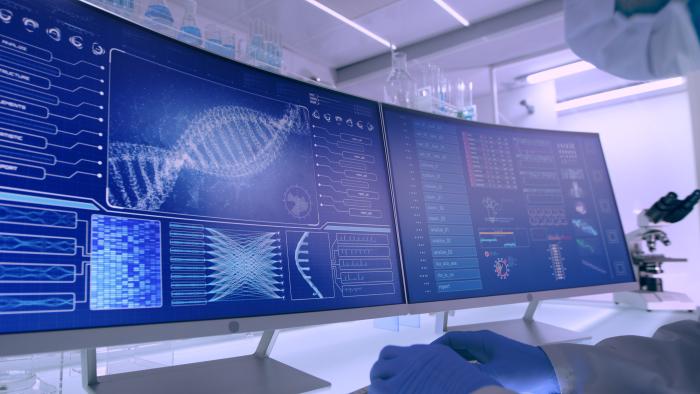
Biotechnology and Life Sciences
Biotechnology involves understanding and leveraging biological systems to produce desired engineering outcomes. MITRE seeks to deliver transformational capabilities through the rapid identification, exploration, and maturation of emerging biotechnologies to solve the nation’s hardest problems. This includes defining new program activities, supporting test and evaluation, identifying technology trends, performing research and development, and developing holistic, integrated solutions across multiple mission domains.
Our Capabilities
Computational Biology
Computational biology involves the use of models and algorithms to identify, characterize, and design biological systems. MITRE is building computational biology methods, tools, and infrastructure to help address critical national challenges related to detecting biological threats, evaluating unknown organisms, and identifying the provenance of biological products. Through advanced prediction and modeling capabilities, our computational biology infrastructure further enables characterization of molecular interactions that drive cellular processes, including those associated with medical countermeasures and biosensing applications.
Biological Safety, Global Biosecurity, and Quality
MITRE meets today’s biosecurity, biosafety, quality, and biodefense needs to solve problems for a safer world. We provide critical and nationally rare expertise in both ISO 17025 technical assessments and biocontainment laboratory design analysis in support of the National Biodefense Strategy. We have experience developing and executing defensible, evidence-based evaluations and assessments, performing laboratory quality audits, and conducting laboratory workflow and design reviews to inform strategy, planning, capability development, and acquisitions for both domestic and international programs.
Medical Countermeasures
MITRE is advancing the design, development, manufacture, and deployment of life saving medical products, or medical countermeasures (MCMs). MCMs are defined broadly to include drugs, vaccines, biologics, sensors, diagnostics, personal protective equipment, wearables, and other technologies that can assist in the detection, diagnosis, prevention, or treatment of a chemical, biological, radiological, or nuclear threat. We also work across the product life cycle, from early-stage research and development to post-market monitoring and distribution, to ensure timely availability and effective use of MCMs for civilian and defense missions.
Human Performance Optimization
The ability to quantify human performance is critical to the successful identification and mitigation of factors that negatively affect it. Quantifying human performance informs actions that reduce the risk of accidents, errors, and injuries, and it maximizes mission outcomes. MITRE is advancing human performance optimization and injury prevention, including the quantitative measurement of performance, exposure, and physiology. This includes wearable and environmental sensor integration, use, and assessment. These efforts result in recommendations for training, personal protective equipment, and standard operating procedures.
Countering Weapons of Mass Destruction (CWMD)/Biodefense
CWMD is focused on the conceptualization, development, possession, proliferation, use, and effects of weapons of mass destruction (WMD). MITRE uses our expertise in biology, chemistry, and radiological and nuclear topics to contextualize adversary-related WMD expertise, materials, technologies, and means of delivery, and to assist counterproliferation efforts to reduce the risks posed by extant WMD. Additionally, our deep understanding of strategic trade controls and illicit procurement of dual-use materials can help prevent the acquisition of WMD by dissuading or impeding access to, or distribution of, sensitive technologies, materials, and expertise.
Synthetic Biology
Synthetic biology uses engineering to genetically augment living systems for useful purposes. Experts in synthetic biology write apps in DNA that they load into organisms to enable them to carry out new functions. Examples include living sensors suitable for extreme environmental conditions, and live therapeutics for the treatment of disease. MITRE is leveraging our expertise in synthetic biology, together with our laboratory capabilities in molecular biology, microbiology, biochemistry, and analytical chemistry, to help solve the nation’s most complex problems.
Bioeconomy
Increasingly, biotechnology is being adopted and advanced by U.S. companies to deliver novel solutions to complex problems in a range of sectors, including energy, materials, agriculture, and health. As described in the recent Executive Order 14081, Advancing Biotechnology and Biomanufacturing Innovation for a Sustainable, Safe, and Secure American Bioeconomy, catalyzing the growth of the bioeconomy is an explicit goal of the federal government. MITRE works with the government to help provide insights into the U.S. bioeconomy, drive growth, and spur innovation.
Emerging Biotechnologies
MITRE has broad expertise in the life sciences, including biotechnology, immunology, infectious disease, microbiology, epidemiology, biology, and biomedical engineering, which we use to provide subject matter expertise and technical awareness of emerging biotechnologies. This includes horizon scanning, technology assessments, and test and evaluation to rapidly identify, develop, and mature emerging biotechnologies, with the goal of improving military, economic, and health security.
Computational biology involves the use of models and algorithms to identify, characterize, and design biological systems. MITRE is building computational biology methods, tools, and infrastructure to help address critical national challenges related to detecting biological threats, evaluating unknown organisms, and identifying the provenance of biological products. Through advanced prediction and modeling capabilities, our computational biology infrastructure further enables characterization of molecular interactions that drive cellular processes, including those associated with medical countermeasures and biosensing applications.
MITRE meets today’s biosecurity, biosafety, quality, and biodefense needs to solve problems for a safer world. We provide critical and nationally rare expertise in both ISO 17025 technical assessments and biocontainment laboratory design analysis in support of the National Biodefense Strategy. We have experience developing and executing defensible, evidence-based evaluations and assessments, performing laboratory quality audits, and conducting laboratory workflow and design reviews to inform strategy, planning, capability development, and acquisitions for both domestic and international programs.
MITRE is advancing the design, development, manufacture, and deployment of life saving medical products, or medical countermeasures (MCMs). MCMs are defined broadly to include drugs, vaccines, biologics, sensors, diagnostics, personal protective equipment, wearables, and other technologies that can assist in the detection, diagnosis, prevention, or treatment of a chemical, biological, radiological, or nuclear threat. We also work across the product life cycle, from early-stage research and development to post-market monitoring and distribution, to ensure timely availability and effective use of MCMs for civilian and defense missions.
The ability to quantify human performance is critical to the successful identification and mitigation of factors that negatively affect it. Quantifying human performance informs actions that reduce the risk of accidents, errors, and injuries, and it maximizes mission outcomes. MITRE is advancing human performance optimization and injury prevention, including the quantitative measurement of performance, exposure, and physiology. This includes wearable and environmental sensor integration, use, and assessment. These efforts result in recommendations for training, personal protective equipment, and standard operating procedures.
CWMD is focused on the conceptualization, development, possession, proliferation, use, and effects of weapons of mass destruction (WMD). MITRE uses our expertise in biology, chemistry, and radiological and nuclear topics to contextualize adversary-related WMD expertise, materials, technologies, and means of delivery, and to assist counterproliferation efforts to reduce the risks posed by extant WMD. Additionally, our deep understanding of strategic trade controls and illicit procurement of dual-use materials can help prevent the acquisition of WMD by dissuading or impeding access to, or distribution of, sensitive technologies, materials, and expertise.
Synthetic biology uses engineering to genetically augment living systems for useful purposes. Experts in synthetic biology write apps in DNA that they load into organisms to enable them to carry out new functions. Examples include living sensors suitable for extreme environmental conditions, and live therapeutics for the treatment of disease. MITRE is leveraging our expertise in synthetic biology, together with our laboratory capabilities in molecular biology, microbiology, biochemistry, and analytical chemistry, to help solve the nation’s most complex problems.
Increasingly, biotechnology is being adopted and advanced by U.S. companies to deliver novel solutions to complex problems in a range of sectors, including energy, materials, agriculture, and health. As described in the recent Executive Order 14081, Advancing Biotechnology and Biomanufacturing Innovation for a Sustainable, Safe, and Secure American Bioeconomy, catalyzing the growth of the bioeconomy is an explicit goal of the federal government. MITRE works with the government to help provide insights into the U.S. bioeconomy, drive growth, and spur innovation.
MITRE has broad expertise in the life sciences, including biotechnology, immunology, infectious disease, microbiology, epidemiology, biology, and biomedical engineering, which we use to provide subject matter expertise and technical awareness of emerging biotechnologies. This includes horizon scanning, technology assessments, and test and evaluation to rapidly identify, develop, and mature emerging biotechnologies, with the goal of improving military, economic, and health security.






